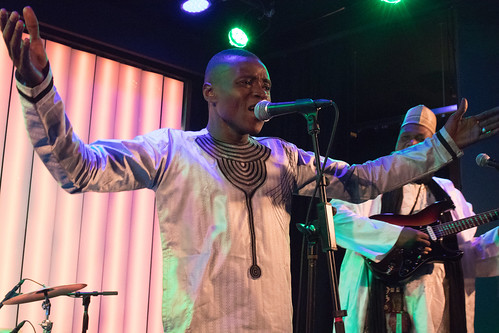Earlier this year, I wrote about the London-based act Ibibio Sound Machine, and the act, which is fronted by Nigerian-born vocalist Eno Williams and features Alfred Kari Bannerman (guitar), Anselmo Netto (percussion), Jose Joyette (drums), Derrick McIntyre (bass), Tony Hayden (trombone, synth), Scott Baylis (trumpet, synth) and Max Grunhard (sax, synth) over the course of their first two albums — 2014’s self-titled debut and 2017’s Uyai — have received attention both nationally and internationally for a sound that’s influenced by golden era West African funk and disco and contemporary post-punk and electro pop.
Now, as you may recall, the London-based act’s third, full-length album Doko Mien is slated for a March 22, 2019 release through Merge Records, and the album which derives its name from the Ibibio phase that translates into English as “tell me,” reportedly finds the act crafting a sonic world of entrancing specificity and comforting universality, essentially blurring the lines separating cultures, between nature and technology, between joy and pain, between tradition and the future. Album title track and first official single, “Doko Mien,” was centered around a glimmering, hook-driven club banger featuring 80s synth funk meets disco-like beats, arpeggiated synths, African polyrhythm, a sinuous bass line and pizzicato guitar and an explosive horn arrangement. Sonically, the song strikes me as a wild, genre-bending amalgamation of I Feel For You-era Chaka Khan, Prince, Michael Jackson‘s “Wanna Be Startin’ Somethin‘,” Chicago house and Fela Kuti — and adding to the globalist vibes, Williams soulfully sings lyrics in both English and Ibibio, the Nigerian dialect from which the London-based act derives its name.
Doko Mien’s second and latest single “Wanna Come Down” continues in a similar, club-banging vein as its predecessor as its centered around a rubbery, Bootsy Collins meets Flea bass line, an explosive horn line, arpeggiated synths and propulsive beats and Williams powerhouse vocals singing lyrics in her native Ibibio and English. Sonically, the song is a wild and seamless synthesis of 80s synth funk, Afrobeat and JOVM mainstays Escort — all while feeling like a sultry come on. In line with the track’s beckoning title, the band’s frontwoman Eno Williams says, “The Ibibio lyrics of the track are about the healing power of the river and the chorus. ‘Wanna come down, get ready ‘coz we’re gonna go’ is inviting people to come, dance and get involved with what’s going on.”





